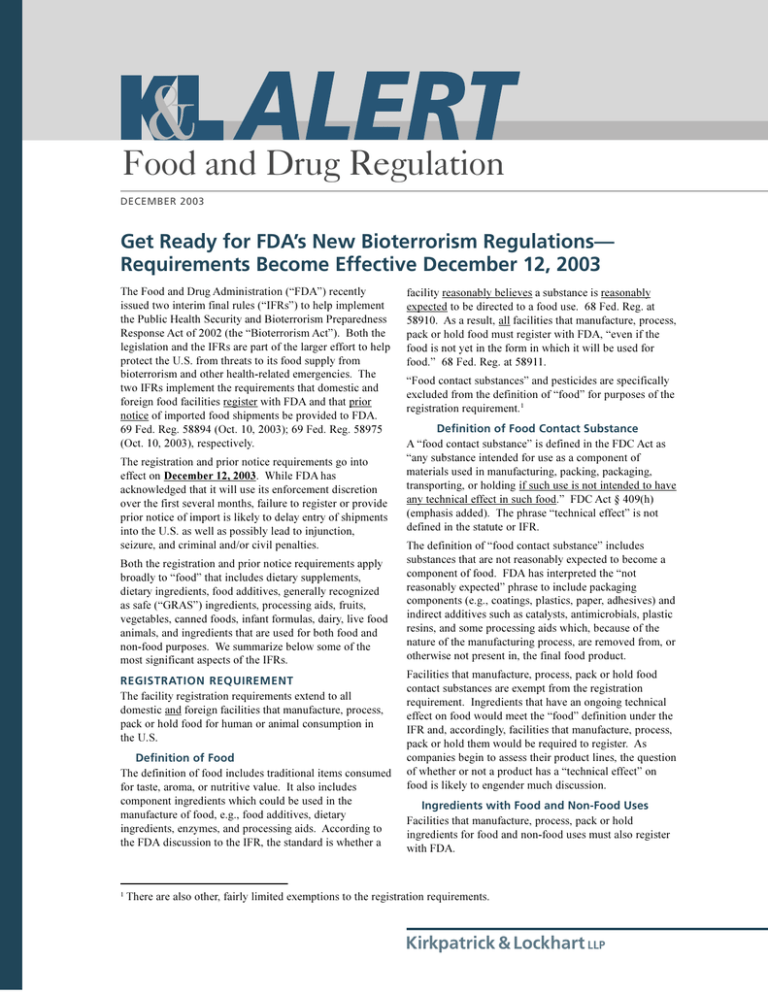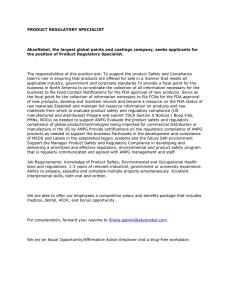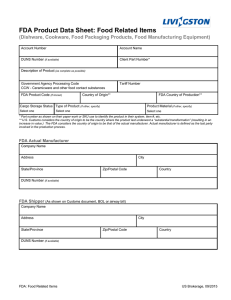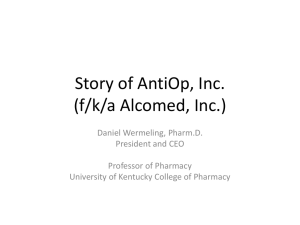
Food and Drug Regulation
DECEMBER 2003
Get Ready for FDA’s New Bioterrorism Regulations—
Requirements Become Effective December 12, 2003
The Food and Drug Administration (FDA) recently
issued two interim final rules (IFRs) to help implement
the Public Health Security and Bioterrorism Preparedness
Response Act of 2002 (the Bioterrorism Act). Both the
legislation and the IFRs are part of the larger effort to help
protect the U.S. from threats to its food supply from
bioterrorism and other health-related emergencies. The
two IFRs implement the requirements that domestic and
foreign food facilities register with FDA and that prior
notice of imported food shipments be provided to FDA.
69 Fed. Reg. 58894 (Oct. 10, 2003); 69 Fed. Reg. 58975
(Oct. 10, 2003), respectively.
The registration and prior notice requirements go into
effect on December 12, 2003. While FDA has
acknowledged that it will use its enforcement discretion
over the first several months, failure to register or provide
prior notice of import is likely to delay entry of shipments
into the U.S. as well as possibly lead to injunction,
seizure, and criminal and/or civil penalties.
Both the registration and prior notice requirements apply
broadly to food that includes dietary supplements,
dietary ingredients, food additives, generally recognized
as safe (GRAS) ingredients, processing aids, fruits,
vegetables, canned foods, infant formulas, dairy, live food
animals, and ingredients that are used for both food and
non-food purposes. We summarize below some of the
most significant aspects of the IFRs.
REGISTRATION REQUIREMENT
The facility registration requirements extend to all
domestic and foreign facilities that manufacture, process,
pack or hold food for human or animal consumption in
the U.S.
Definition of Food
The definition of food includes traditional items consumed
for taste, aroma, or nutritive value. It also includes
component ingredients which could be used in the
manufacture of food, e.g., food additives, dietary
ingredients, enzymes, and processing aids. According to
the FDA discussion to the IFR, the standard is whether a
1
facility reasonably believes a substance is reasonably
expected to be directed to a food use. 68 Fed. Reg. at
58910. As a result, all facilities that manufacture, process,
pack or hold food must register with FDA, even if the
food is not yet in the form in which it will be used for
food. 68 Fed. Reg. at 58911.
Food contact substances and pesticides are specifically
excluded from the definition of food for purposes of the
registration requirement.1
Definition of Food Contact Substance
A food contact substance is defined in the FDC Act as
any substance intended for use as a component of
materials used in manufacturing, packing, packaging,
transporting, or holding if such use is not intended to have
any technical effect in such food. FDC Act § 409(h)
(emphasis added). The phrase technical effect is not
defined in the statute or IFR.
The definition of food contact substance includes
substances that are not reasonably expected to become a
component of food. FDA has interpreted the not
reasonably expected phrase to include packaging
components (e.g., coatings, plastics, paper, adhesives) and
indirect additives such as catalysts, antimicrobials, plastic
resins, and some processing aids which, because of the
nature of the manufacturing process, are removed from, or
otherwise not present in, the final food product.
Facilities that manufacture, process, pack or hold food
contact substances are exempt from the registration
requirement. Ingredients that have an ongoing technical
effect on food would meet the food definition under the
IFR and, accordingly, facilities that manufacture, process,
pack or hold them would be required to register. As
companies begin to assess their product lines, the question
of whether or not a product has a technical effect on
food is likely to engender much discussion.
Ingredients with Food and Non-Food Uses
Facilities that manufacture, process, pack or hold
ingredients for food and non-food uses must also register
with FDA.
There are also other, fairly limited exemptions to the registration requirements.
Kirkpatrick & Lockhart LLP
For example, USP/NF chemicals and substances such as
gelatin, which has food, pharmaceutical, and technical
applications, will be considered food if the facility that
manufactures, processes, packs or holds the multi-use
product reasonably believes that the product is
reasonably expected to be directed to a food use.
Consequently, it will be important for facilities to have
tight procedures in place to track inventory, product
claims, marketing materials, and customers to be able to
assess whether registration is required. Good
communication with suppliers is also essential to assure
that the appropriate facilities have been registered.
Registration Process
Registration can be done either by mail using FDA Form
3537 or electronically at FDAs website: http://
www.cfsan.fda.gov/~furls/ovffreg.html. FDA is
encouraging facilities to register through its website.
Foreign facilities must identify a U.S. agent on the
registration form. The agent must be an individual who
either resides or has a business in the U.S. and who is
present in the U.S. The agent could be the U.S.
distributor, the U.S. representative of a non-U.S. company,
or another individual, including an attorney or consultant.
K&L would be pleased to serve as a companys U.S.
agent.
PRIOR NOTICE REQUIREMENT
The prior notice requirement applies to food for human
and animal consumption that are imported or offered for
import into the U.S.2 Failure to provide prior notice of
2
food shipments could result in FDAs detaining the
shipment or barring entry into the country.
Starting December 12, 2003, prior notice of import must
be submitted electronically within a specified time frame,
depending upon mode of arrival. Any individual with
knowledge of the required information may submit the
prior notice, including, but not limited to, brokers,
importers, and U.S. agents.
Most of the prior notice information required by the IFR
is data usually provided by importers or brokers to the
Bureau of Customs and Border Protection (CBP) when
foods arrive in the U.S. Now, the Bioterrorism Act
requires that this information also be provided to FDA in
advance of an imported foods arrival to the U.S. Nearly
all of the current imported food shipments can comply by
using CBPs Automated Broker Interface of the
Automated Commercial System (ABI/ACS). FDA will
use this information in advance of the arrival to review,
evaluate, and assess the information, and determine
whether to inspect the imported food.
FDA estimates that over 420,000 food facilities worldwide
will need to register and over 25,000 import notices per
day will be received. To reduce the threat of delay and
potential harm to business, companies should be thinking
about ways to manage their supply chain and internal
procedures and policies to assure compliance. Please let
us know if we can be of assistance.
SUZAN ONEL
202.778.9134
sonel@kl.com
Limited exemptions apply.
Kirkpatrick & Lockharts Food & Drug Practice offers comprehensive legal and regulatory counseling to companies
and other organizations regulated by FDA under the Federal Food, Drug, and Cosmetic Act. The Food & Drug
Practice represents manufacturers and distributors of food, dietary supplement, pharmaceutical, medical device,
personal care and cosmetic products, and products of biotechnology, as well as trade associations, individuals and
institutions involved in clinical research of FDA-regulated products.
PARTNERS
Suzan Onel
Gary L. Yingling
202.778.9134 sonel@kl.com
202.778.9124 gyingling@kl.com
OF COUNSEL
Emalee G. Murphy
202.778.9428 emalee.murphy@kl.com
ASSOCIATES
Ann M. Begley
202.778.9365 abegley@kl.com
Rebecca L. Dandeker 202.778.9409 rdandeker@kl.com
Joshua S. Kim
202.778.9039 jkim@kl.com
®
Kirkpatrick & Lockhart LLP
Challenge us.®
www.kl.com
BOSTON
n
DALLAS
n
HARRISBURG
n
LOS ANGELES
n
MIAMI
n
NEWARK
n
NEW YORK
n
PITTSBURGH
n
SAN FRANCISCO
n
WASHINGTON
.........................................................................................................................................................
This publication/newsletter is for informational purposes and does not contain or convey legal advice. The information herein
should not be used or relied upon in regard to any particular facts or circumstances without first consulting a lawyer.
© 2003 KIRKPATRICK & LOCKHART LLP.
ALL RIGHTS RESERVED.






